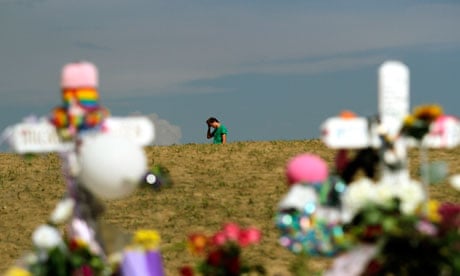Last Thursday, James Holmes killed 12 people and wounded 59 others in one of the worst mass shootings in American history. This is a depressingly familiar tale of modern American life – the massacre of innocent people with guns and ammunition legally acquired with relative ease. Unfortunately while such mass killings are all too prevalent, so too is the muted response of policymakers.
The Aurora shooting bleakly follows this pattern: liberals call for more gun control measures; conservatives argue that we need more not less armed Americans to keep us safe. In the end, some of the weakest gun control laws in the developed world remain.
Now imagine this scenario with a different protagonist. Imagine if the killer was a young jihadist, trained in the wilds of Pakistan's FATA region, or Yemen. Imagine if the atrocity was replicated in other theaters around the country as a co-ordinated mass killing. How would the reaction to this crime differ? It's not hard to imagine at all. For example, after the so-called underwear bomber failed to blow up an American plane in December 2009, the US ramped up its drone operations against al-Qaida in Yemen. Or go further back to September 11: 3,000 Americans were killed in the worst terrorist attack in American history. In response, the US spent more than $3tn in direct and indirect costs. In addition, subsequent invasions of Afghanistan and Iraq led to more Americans being killed or maimed than died on 11 September itself.
But the larger point here is that the country's political leaders activated resources to deal with the perceived threat that came from terrorism – military and intelligence budgets were significantly increased; foreign wars were started; homeland security was tightened up. Ten years after 9/11, the US is still waging wars in Afghanistan, Pakistan, Yemen and Somalia to defeat terrorists who were, last year, responsible for the deaths of 17 Americans. Efforts to lower defence spending simply to the unjustifiably high levels of a mere five years ago have been met with criticisms from both Republicans and Democrats. In short, even as the obvious threat from terrorism has decreased, the US continues to squander blood and treasure in fighting it.
Contrast this mobilisation with efforts, for example, to save the lives of those Americans who die from lack of healthcare coverage. From 2000 to 2006 – a time when the war on terrorism was operating at full speed – 137,000 Americans died prematurely because they didn't have health insurance. Nothing was done on the federal level to alleviate their suffering though thankfully progress has been made on this front since then, against great political opposition.
The vast majority of Americans die from one of four ailments: cardiovascular disease, cancer, diabetes and chronic lung disease. Each of these is primarily caused by risk factors that are quite preventable: smoking, diet, lack of physical activity and alcohol. This isn't even to mention the creeping reality of global warming, which has the potential to threaten the homes and livelihoods of millions. And then of course, there is America's high rate of gun-related deaths.
The cynical might argue that the lack of a major response to the Aurora shooting is a result of the powerful influence of the gun lobby in Washington, and the reluctance of politicians to risk their wrath – and that's certainly part of it. But the lack of action on minimising gun-related violence in the US is actually very much consistent with how Americans deal with the many domestic threats in our midst.
Though all of the issues mentioned here would qualify as genuine national emergencies, little has been done to confront them In fact, in just the past few weeks, Republicans in the House tried for the 33rd time to repeal the healthcare bill that will provide 30 million Americans with access to health insurance; they have continued to support policies that have led to a 20% reduction in the public health workforce and have even sought to eliminate preventive healthcare initiatives. Let's not even get started on how Congress is dealing with global warming.
The reasons for this odd situation – in which Americans overreact to foreign challenges and barely react to real and growing domestic threats – are many. Some of it is psychological: the unknown can seem scarier than the known. In some cases, there are no obvious or immediate policy solutions to domestic challenges. There is the often kneejerk anti-centralism of many Americans – and iron-clad belief that expansion of government to deal with serious national challenges will inevitably lead to a loss of freedom (except when fighting foreign enemies of course). There are the failures of not just the country's political leaders, but also its political system. Or perhaps it is simply a refusal by Americans to realise our own limitations and faults as a nation.
But whatever the reason, the result is the same – a nation that, as Mitt Romney noted yesterday, sees itself as the "greatest force for good in the world" but is rotting from the inside because it has yet to come to grips with its own domestic maladies. The shooting in Aurora is indicative of a particular national sickness – a fetishisation of guns and propensity for spectacular violence. But the response (or lack thereof) to this latest American tragedy speaks to something else: a national denial about that which really threatens us.
